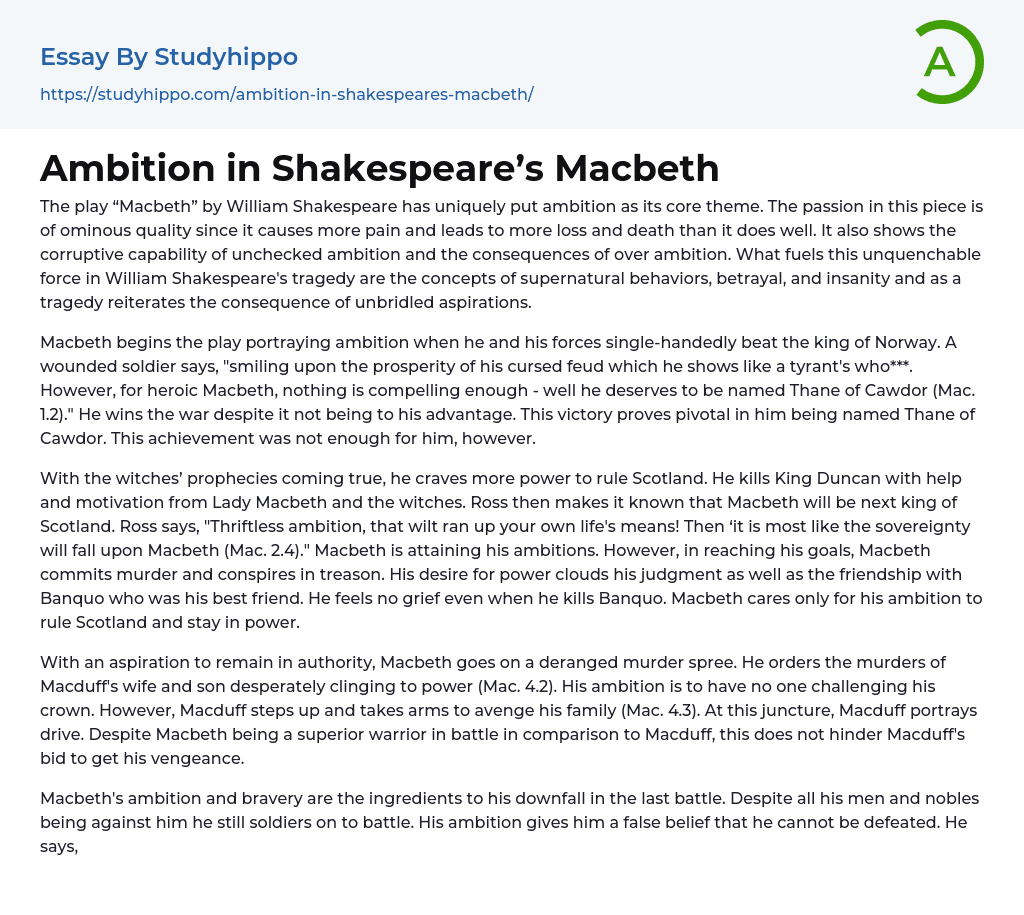The play “Macbeth” by William Shakespeare has uniquely put ambition as its core theme. The passion in this piece is of ominous quality since it causes more pain and leads to more loss and death than it does well. It also shows the corruptive capability of unchecked ambition and the consequences of over ambition. What fuels this unquenchable force in William Shakespeare's tragedy are the concepts of supernatural behaviors, betrayal, and insanity and as a tragedy reiterates the consequence of unbridled aspirations.
Macbeth begins the play portraying ambition when he and his forces single-handedly beat the king of Norway. A wounded soldier says, "smiling upon the prosperity of his cursed feud which he shows like a tyrant's who***. However, for heroic Macbeth, nothing is compelling enough - well he deserves to be named Tha
...ne of Cawdor (Mac. 1.2)." He wins the war despite it not being to his advantage. This victory proves pivotal in him being named Thane of Cawdor. This achievement was not enough for him, however.
With the witches’ prophecies coming true, he craves more power to rule Scotland. He kills King Duncan with help and motivation from Lady Macbeth and the witches. Ross then makes it known that Macbeth will be next king of Scotland. Ross says, "Thriftless ambition, that wilt ran up your own life's means! Then ‘it is most like the sovereignty will fall upon Macbeth (Mac. 2.4)." Macbeth is attaining his ambitions. However, in reaching his goals, Macbeth commits murder and conspires in treason. His desire for power clouds his judgment as well as the friendship with Banquo who was his best friend. He feels no grief even when he kills
Banquo. Macbeth cares only for his ambition to rule Scotland and stay in power.
With an aspiration to remain in authority, Macbeth goes on a deranged murder spree. He orders the murders of Macduff's wife and son desperately clinging to power (Mac. 4.2). His ambition is to have no one challenging his crown. However, Macduff steps up and takes arms to avenge his family (Mac. 4.3). At this juncture, Macduff portrays drive. Despite Macbeth being a superior warrior in battle in comparison to Macduff, this does not hinder Macduff's bid to get his vengeance.
Macbeth's ambition and bravery are the ingredients to his downfall in the last battle. Despite all his men and nobles being against him he still soldiers on to battle. His ambition gives him a false belief that he cannot be defeated. He says, "Why should I play the Roman fool, and die on my sword? Whiles, I see lives, the gashes would do better on them (Mac. 5.8)." He believes he will not lose. However, his over-achiever ambition leads to his demise. He dies fighting to stay in power.
Within the play, numerous factors fuel Macbeth's unchecked aspirations. First, the supernatural aspect of the weird sisters' prophecy that he, Macbeth, will be named Thane of Cawdor. This prophecy is a powerful motivation for Macbeth, and it comes to pass even before he gets home from battle and encourages his drive to power. The second prophecy that he will become king of Scotland (Mac. 1.3) is, even more, a drive. This one, Macbeth is too impatient to wait for its atonement. His ambition to attain power pushes him to kill King Duncan. Knowing his aspirations
will be thwarted if his involvement in the murder is foiled, he kills the king's guards i.e. the Chamberlains and places the blame on them.
Lady Macbeth is another influencing aspect in Macbeth's ambition. After getting home, Macbeth informs his wife of the prophecies the sisters shared with him. Lady Macbeth urges her husband on saying, "I have given suck, and know, how tender it is to love the babe that sucks my breasts. I would while it was smiling in my face, pull my nipple from its boneless gums, and smash the brains out if I had sworn as you have done this (Mac. 1.7)." With one prophecy realized and the king's untimely demise at the hands of Macbeth, he feels culpable. The lady encourages her husband to overcome his sense of guilt and drive for the open throne. She reminds him of the weird sisters' prophecies. She becomes a building block to Macbeth's ambitious but tyrannical rule.
Fear is Macbeth's third factor pushing his ambition. His fear of being found out drives him to a murdering rampage. His first murder in trying to conceal his ambitious drive is that of the Chamberlains, so they don't snitch on him killing the King. He then sends assassins that kill Banquo who was the only other person who knew of the witches' prophesies (Mac. 3.3). At this point, Macbeth's ambition is getting out of hand. He then goes after King Duncan's family to ensure there is no heir to the throne left in Duncan's lineage; he kills women and children in his deranged state. On recalling the witches prophesies on Banquo's descendants being future kings he fears being
toppled and targets the unsuspecting children.
The ambition, like Shakespeare shows, is destructive and wrong in all aspects. Unbridled aspiration, as shown in the play Macbeth, often results in desperate actions which bear dire consequences. Macbeth and Lady Macbeth's deaths were both due to his raw ambition. Macbeth is deservedly the center of attention concerning this plays ambition. His aspiration knows no bounds plus he was willing to do anything and everything to reach his ultimate goal.
Works Cited
Shakespeare, William. “Macbeth: Entire Play.” Macbeth: Entire Play. N.p., 2016. Web. O7 December 2016.




